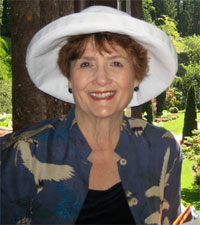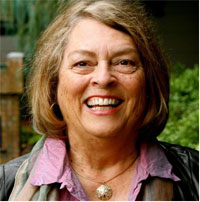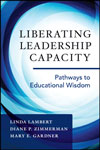Linda Lambert, Ed.D. is Professor Emeritus from California State University, East Bay, and a full time author of novels and texts on leadership.
During Linda’s career extensive career, she has served as social worker, teacher, principal, district and county directors of adult learning programs, as well as university professor, state department envoy to Egypt, and international consultant. Her international consultancies in leadership have taken her to the Middle East, England, Thailand, Mexico, Canada, Thailand, and Malaysia.
 Linda is the author of dozens of articles and lead author of The Constructivist Leader (1995, 2002), Who Will Save Our Schools (1997), and Women’s Ways of Leading (2009); she is the author of Building Leadership Capacity in Schools (1998) and Leadership Capacity for Lasting School Improvement (2003). Linda’s first historical novel, Cairo Codex, released in August, 2013, to be followed by Etruscan Evenings in 2014. The third novel in the Justine Trilogy, A Rapture of Ravens, Awakening in Taos, will be released in late 2014.
Linda is the author of dozens of articles and lead author of The Constructivist Leader (1995, 2002), Who Will Save Our Schools (1997), and Women’s Ways of Leading (2009); she is the author of Building Leadership Capacity in Schools (1998) and Leadership Capacity for Lasting School Improvement (2003). Linda’s first historical novel, Cairo Codex, released in August, 2013, to be followed by Etruscan Evenings in 2014. The third novel in the Justine Trilogy, A Rapture of Ravens, Awakening in Taos, will be released in late 2014.
She lives with her husband, Morgan, a retired school superintendent, on The Sea Ranch, California.
 Mary e. Gardner, co-author, Women’s Ways of Leading
Mary e. Gardner, co-author, Women’s Ways of Leading
For two decades, Linda Lambert and Mary Gardner have worked together as colleagues, friends and co-authors on two best-selling books on leadership, The Constructivist Leader (1995, 2002). They served in top-level leadership positions, engaged in research on women and leadership, consulted internationally, and mentored the next generation of women leaders.
Dr. Lambert is also lead author of Who Will Save Our Schools?, three books on leadership capacity and dozens of articles. She worked to set up community schools for girls in Egypt and advised organizations in Canada, England, Malaysia, Thailand, Australia, Mexico, and throughout the United States. A former social worker, school principal and university professor, Lambert is the president of Lambert Leadership Development, The Sea Ranch, California.
Gardner is the former superintendent of the Saratoga, California, school district, a visiting practitioner at Harvard University, and a professor of educational leadership. She consults with non-profit organizations and has served on five boards of directors.
The authors joined forces in the early 1990s when Gardner, fresh from her work at Harvard, was asked to take Lambert’s position at California State University just as Lambert was leaving for two years of work in Egypt. Upon Lambert’s return, the two women soon discovered that they were soul mates and set about to investigate leadership as a historically limited concept. The result of this stimulating partnership was two provocative best-selling books, multimedia presentations on women’s leadership and team teaching. Soon, Gardner moved to the Saratoga district as superintendent, and the friendship deepened, now involving a close examination of the application of constructivist leadership principles to a school district.
In the years that followed, the women’s leadership studies were expanded as broader study arenas were identified. In addition to the San Francisco Bay Area, where both women lived, Los Angeles, Seattle, the province of Alberta, Canada, and Malaysia became centers of inquiry. Themes emerged as women from the various places, ages and careers responded to questions, told stories and entered into dialogue with each other. The experiences of the women were remarkably similar, the struggles familiar. Gender issues became predictable, yet the level of maturity significantly influenced how each woman related to the themes. The result of these fifteen years of inquiry and colleagueship is the long-awaited book, Women’s Ways of Leading.
Lambert and Gardner’s work with constructivist leadership, leadership capacity, and women’s leadership is creating new patterns of relationships among individuals and within organizations, resulting in the fuller democratization of leadership. Such democratization ensures a resilient and replenishing fabric of leadership, the essence of sustainability.





 Conceptions of leadership have evolved, and Liberating Leadership Capacity captures these new ideas and provides a pathway to create sustainable systems of high leadership capacity. Available April 2016 from
Conceptions of leadership have evolved, and Liberating Leadership Capacity captures these new ideas and provides a pathway to create sustainable systems of high leadership capacity. Available April 2016 from  A sizzling new novel set in Taos, New Mexico. The third in the Justine Trilogy, preceded by the award-winning, The Cairo Codex and The Italian Letters. Buy it at your local independent bookstore,
A sizzling new novel set in Taos, New Mexico. The third in the Justine Trilogy, preceded by the award-winning, The Cairo Codex and The Italian Letters. Buy it at your local independent bookstore, 
